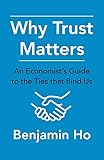Why Trust Matters : An Economist's Guide to the Ties That Bind Us / Benjamin Ho.
Material type: TextPublisher: New York, NY : Columbia University Press, [2021]Copyright date: ©2021Description: 1 online resource : 9 b&w figuresContent type:
TextPublisher: New York, NY : Columbia University Press, [2021]Copyright date: ©2021Description: 1 online resource : 9 b&w figuresContent type: - 9780231548427
- 330.01/9 23
- online - DeGruyter
| Item type | Current library | Call number | URL | Status | Notes | Barcode | |
|---|---|---|---|---|---|---|---|
 eBook
eBook
|
Biblioteca "Angelicum" Pont. Univ. S.Tommaso d'Aquino Nuvola online | online - DeGruyter (Browse shelf(Opens below)) | Online access | Not for loan (Accesso limitato) | Accesso per gli utenti autorizzati / Access for authorized users | (dgr)9780231548427 |
Browsing Biblioteca "Angelicum" Pont. Univ. S.Tommaso d'Aquino shelves, Shelving location: Nuvola online Close shelf browser (Hides shelf browser)

|

|

|

|

|

|

|
||
| online - DeGruyter Mind Beyond Brain : Buddhism, Science, and the Paranormal / | online - DeGruyter Jacques Schiffrin : A Publisher in Exile, from Pléiade to Pantheon / | online - DeGruyter Lacan : Anti-Philosophy 3 / | online - DeGruyter Why Trust Matters : An Economist's Guide to the Ties That Bind Us / | online - DeGruyter Nikolai Nikolaevich and Camouflage : Two Novels / | online - DeGruyter The Death of Idealism : Development and Anti-Politics in the Peace Corps / | online - DeGruyter Threatening Property : Race, Class, and Campaigns to Legislate Jim Crow Neighborhoods / |
Frontmatter -- BRIEF CONTENTS -- Acknowledgments -- 1 Economics of Trust -- 2 The History of Trust -- 3 Trust in the Modern Economy -- 4 Trusting Institutions with Expertise -- 5 Trusting One Another -- 6 Conclusion -- Detailed Contents -- Notes -- Index
restricted access online access with authorization star
http://purl.org/coar/access_right/c_16ec
Have economists neglected trust? The economy is fundamentally a network of relationships built on mutual expectations. More than that, trust is the glue that holds civilization together. Every time we interact with another person—to make a purchase, work on a project, or share a living space—we rely on trust. Institutions and relationships function because people place confidence in them. Retailers seek to become trusted brands; employers put their trust in their employees; and democracy works only when we trust our government.Benjamin Ho reveals the surprising importance of trust to how we understand our day-to-day economic lives. Starting with the earliest societies and proceeding through the evolution of the modern economy, he explores its role across an astonishing range of institutions and practices. From contracts and banking to blockchain and the sharing economy to health care and climate change, Ho shows how trust shapes the workings of the world. He provides an accessible account of how economists have applied the mathematical tools of game theory and the experimental methods of behavioral economics to bring rigor to understanding trust. Bringing together insights from decades of research in an approachable format, Why Trust Matters shows how a concept that we rarely associate with the discipline of economics is central to the social systems that govern our lives.
Mode of access: Internet via World Wide Web.
In English.
Description based on online resource; title from PDF title page (publisher's Web site, viewed 01. Dez 2022)


